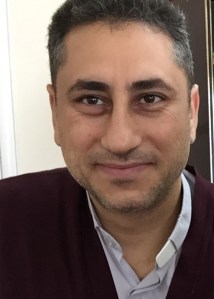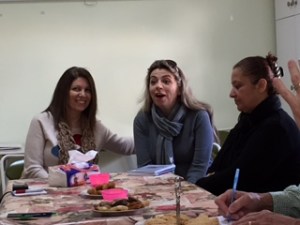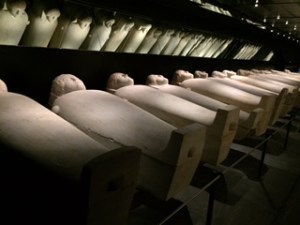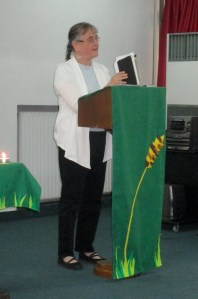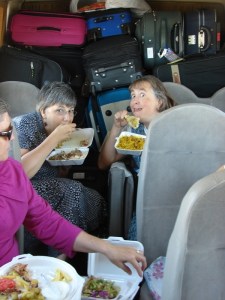In those days a decree went out from Emperor Augustus that all the world should be registered. This was the first registration and was taken while Quirinius was governor of Syria. All went to their own towns to be registered. Joseph also went from the town of Nazareth in Galilee to Judea, to the city of David called Bethlehem, because he was descended from the house and family of David. He went to be registered with Mary, to whom he was engaged and who was expecting a child. While they were there, the time came for her to deliver her child. And she gave birth to her firstborn son and wrapped him in bands of cloth, and laid him in a manger, because there was no place for them in the inn. (Luke 2:1-7)
2020 has been not only the year of the pandemic, but the year of the census. So along with a daily accounting of infections and sadly, deaths, we have also been busy counting the people in our country.
It reminds me as I read this passage and eyeball that word census, my own family had a way of counting its members a long time ago, and there was always room for one more…
For many years the trophy sat on a shelf in our kitchen. It was tarnished with age, and dangling from its edges were little markers strung on ribbons. On each marker was a photo on one side and a birth date on the other. After WWII, one of the aunts (I’m guessing my dad’s sister Heddy), thought it would be a great way to commemorate their growing families. When one of them had a baby, the trophy would be passed to that house, the marker would be added, and then they would wait for the next baby before passing it along again.
My dad arrived eight years after Heddy, who was at the time the youngest of four. My dad took her place as the baby, and when he got married and started the pack known as the Prescott cousins, the others had finished having their families. 1956 marked the year when the trophy came to our house…and stayed. Many years later, it was passed on as the generation represented on those markers began their own families. There was always room for one more. My cousin Gay has it now, as she is the keeper of all things related to our Piskac family.
That was our census taking mechanism.
I am writing about this on Christmas Eve, because I know my own birth story as recounted by my dad to me, reminds me of the birth of Jesus into his family, and that is what I am reflecting on this night, Christmas Eve in quarantine, 2020.
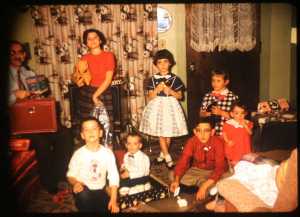
Christmas Eve, 1958, Grandma and Grandpa’s house at 1213 D Street in Omaha. There are the Omaha cousins whose names hung on the trophy. Seated to the far right is my mom Jeanne, holding baby Julie.
My birthday is December 19th, and I always wished I was born on Christmas. My dad told me that he and mom were worried that might be the case, and if so, they and I would miss the big annual gathering at Grandpa and Grandma Piskac’s house, where all the Omaha aunts, uncles, in-laws, and cousins would gather. So they had Dr. Baum induce me. Mom and I spent a few days in the hospital, and then they brought me home. And they made room for me at Grandpa’s on Christmas Eve. I can imagine that I was passed from one aunt to another, and that the grandmas present also took their turn. Such love in a big family all gathered together on such a night! There was room for one more, and that was me.

On the porch of Grandpa’s house at 1402 B Street, 1965. See how that family has grown? All of them, including Baby Cathy born the previous December (being held by our cousin Joyce) have markers on that trophy. And obviously there was room for one more, because Joyce’s then boyfriend is standing behind Grandpa. There was room for him in 1965, but Joyce didn’t marry him. She married another.
In this time of quarantine, we miss the big family gatherings where you pack everyone at the table, where there was always room for one more, just like there was room for me. With that in mind, here’s a new way to arrange your Christmas nativity set this year.
Dr. Ken Bailey, in his book Jesus Through Middle Eastern Eyes, writes of “critical flaws” in our simple, black-and-white reading of Luke’s text. Joseph and Mary were renounced by their family. Arriving in Bethlehem for the census, there is no room for them at the inn. They are forced to reside in a stable where Jesus is born and placed in a manger. It has been told as a story of rejection and loneliness.
But what if Jesus, Emmanuel, God with us, was born into the bosom of family, not rejected at birth, but fully embraced in the community of his extended family? What if, in the culture of the place where family and hospitality are important, a pregnant Mary was brought in and cared for by the women of the family? What if the “inn” is actually a small guest room in a house already stuffed with other family members there for the census? The Greek word used by Luke for inn is “katalyma,” which is more like a guest room. These small homes would also hold the livestock at night, adding warmth to the house and keeping the ox and ass safe from thieves. And the manger where they put the baby Jesus was the feeding trough for the animals…inside the house. (Isn’t it amazing that the text never mentions an innkeeper, and yet somehow every year churches put on pageants featuring this man who is not there?)
Family and hospitality are key aspects of Middle Eastern culture as I have experienced it firsthand on my trips to Syria, Lebanon and Iraq. I have been invited to tea by shopkeepers in souqs, while they packed up my purchases. I have been offered cool refreshment in especially hot weather by observant Muslims during Ramadan, when they go without until sunset. I have watched from afar as a devastating blast on August 4, in the port of Beirut made 300,000 instantly homeless, and they were invited into the homes of others. Why would Joseph’s family treat him and his young bride any differently in their circumstance? There is always room for one more.
I checked this out with a friend of mine, Syrian by birth, who lives in Lebanon and is a pastor and a theologian. Riad assured me that this is how the people of the Middle East, those who live where Jesus was born, lived and had his ministry, would understand this story. He said that he remembers small houses like this, where the guest room, the katalyma, was a small, elevated platform over the main living area.
Can’t you just imagine the gathered aunts and grandmas and young cousins, all together to be counted for the census, passing that little baby from one set of arms to another? I am sure it was just like Christmas Eve at Grandpa’s house in 1958 when I was born.
This, to me, is the good news of Jesus’ coming: he came to be with us, and he got that start with us, in the warmth of a house filled with family, which is what we all celebrate at Christmas…and how we celebrate it! He showed us how to do it…now, let us all make room for more.
Earlier this year at a memorial service, I heard a wise pastor explain that sometimes we need some help with the translations from the original words. He gave me new perspective on Psalm 23. “Surely goodness and mercy shall follow me all the days of my life” is better translated as “surely goodness and mercy shall RUN AFTER ME, PURSUE ME, all the days of my life.”
God-with-us, Emmanuel, Jesus, the same One whose grace and mercy doesn’t merely follow me, but actively runs me down, is bold enough to live His name and be born within the bosom of family.
We all put out our lonely manger scenes with animals, feeding trough, and those three kings who come later. But right now to keep in tune with the real story, go find all those trolls and pocket pals and miniature Beanie Babies, whatever you have, and stuff them in. It’s Christmas! There is always room for one more!
Kenneth Bailey, “Jesus Through Middle Eastern Eyes: Cultural Studies in the Gospels,” InterVarsity Press, 2008.
https://www.1517.org/articles/three-hidden-hebrew-treasures-in-psalm-23










